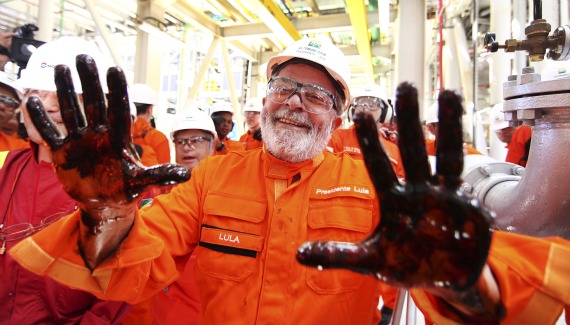Will Brazil Face the Energy Curse?
More on:

Each day it seems Brazil finds more and more oil in the Santos Basin. Its estimated reserves almost doubled this year, totaling over 30 billion barrels (some expect them to rise as high as 50 billion barrels). This launches Brazil’s reserves to 9th in the world, just behind Russia’s.
In the last months of the Lula administration, the government passed legislation that would make Petrobras, the state-controlled oil giant, the operator of these new finds. It grants Petrobras at least a 30% stake in all future joint ventures, with contracts to be awarded to companies offering the largest share of output to the government. These changes, and the increasing role of the state, have led many to question whether the newfound oil may prove a curse rather than a blessing.
Brazil has a better chance than most to achieve the vaunted Norwegian model of oil exploitation, and avoid the pitfalls of the Middle East (or closer to home in Venezuela). In large part this is due to timing. Countries such as Venezuela, Saudi Arabia, or Nigeria found oil at the start of their process of state formation. Oil let them avoid hard choices – in particular the need for a broad based economy to tax (as well as subsequent demands for representation). Brazil already has a vibrant and diversified economy, which won’t easily fade, even with the oil influx.
Second, Brazil has had significant experience in implementing national energy policies. During the 1970s, Brazil faced a situation somewhat similar to that the United States faces today – overreliance on foreign oil during years of volatile pricing. In an effort to limit its dependence, Brazil’s military government boosted hydroelectric power, and created Pro-Alcool, the National Alcohol Program. It created a now world class ethanol industry by offering low-cost loans and credit guarantees, mandating percentages in gasoline, setting government purchase prices, and guaranteeing monopolistic distribution by the state-owned energy company, Petrobras. Forty years later, Brazil is second only to the United States in terms of ethanol production, which powers 20% of its transportation matrix. Now largely self-sufficient, its overall energy portfolio is one of the cleanest in the world. While the pre-salt finds will test this last achievement, Brazil’s history of energy management shows that it can conduct a successful long-term energy policy.
Third, the pre-salt oil is hard to get at. Buried almost four miles below the ocean surface and a mile-thick layer of salt (the reason for the name), it is relatively expensive to extract. Unlike Mexico’s Cantarell fields, which were discovered by a fisherman as the oil seeping to the surface tangled his nets, extraction will require significant technology, expertise, and management. The time and effort needed to extract may work in Brazil’s favor, boosting local human capital and technology companies rather than the reverse. It may also mean that revenues enter the domestic economy more slowly, limiting the inflationary effects on domestic prices and other areas of the economy (avoiding the so-called Dutch disease.). Brazil already faces inflationary pressure—from both industrial expansion and natural resources like timber, iron ore, and beef—but prudent use of oil revenue could help not hinder their already impressive long-term growth prospects.
Finally, and perhaps counterintuitively, Brazil’s vibrant (if messy) democracy may rescue it from a less attractive fate. Hardly immune from patronage, corruption, and the like, Brazil’s democratic politics provide a platform for a multitude of interests and a system of checks and balances between branches and levels of government. This true political back-and-forth and compromise has never fully operated in the Middle East (much to the region’s detriment), and arguably was never firmly established next door in Venezuela. This isn’t to suggest that everyone gets heard in Brazil or that special interests don’t have a louder say than others. But it does give a broader array of political and economic players a voice, something that doesn’t occur under non-democratic regimes.
Taken together this suggests that the pre-salt oil can be what the Brazilians dream about— a means to tackle the big issues of poverty and structural inequality by boosting the social safety net, improving education, investing in infrastructure, and continuing to build foreign reserves to protect against inflation. The technological investment could also spill over into the broader economy, attracting engineers, scientists, and oilfield specialists. There are some positive examples from emerging economies— most notably Chile. Under its democratic leadership, it has managed its copper reserves (making up sixteen percent of GDP and nearly half of all exports—more than enough to curse instead of bless the nation) quite admirably. Let’s hope that Brazil follows a similar path.
More on:
 Online Store
Online Store
